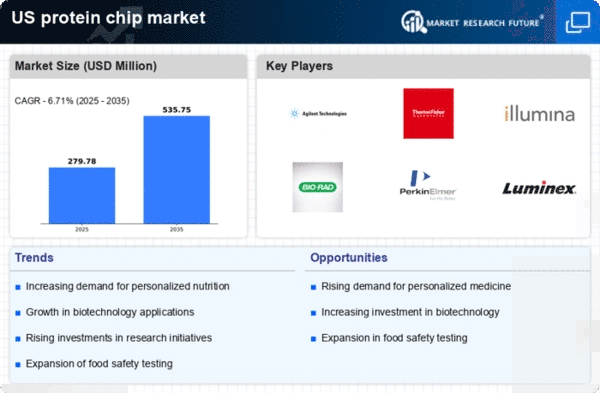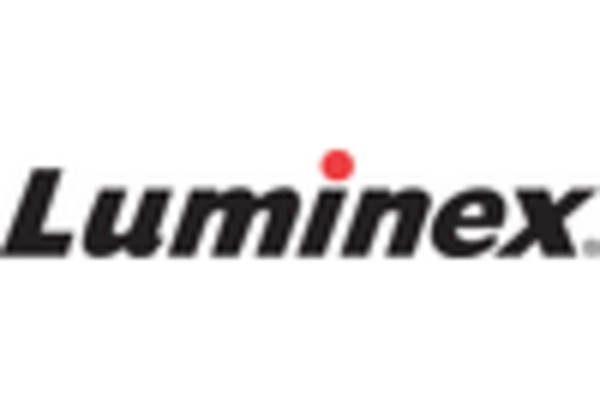Advancements in Proteomics Research
The protein chip market is benefiting from significant advancements in proteomics research, which focuses on the large-scale study of proteins and their functions. As researchers uncover the complexities of protein interactions and their roles in various biological processes, the demand for protein chips is likely to increase. In 2025, the proteomics market is anticipated to reach $25 billion, with protein chips playing a crucial role in high-throughput analysis. This growth is indicative of the expanding applications of protein chips in drug development, biomarker discovery, and personalized medicine. Consequently, the protein chip market is poised for growth as it aligns with the evolving needs of the scientific community.
Growing Investment in Biotechnology
The protein chip market is experiencing a surge in investment from both public and private sectors. This influx of capital is primarily directed towards research and development initiatives aimed at enhancing the capabilities of protein chips. In 2025, the biotechnology sector in the US is projected to reach approximately $300 billion, with a significant portion allocated to innovative diagnostic tools, including protein chips. This financial backing is likely to accelerate advancements in chip technology, enabling more precise and efficient applications in various fields such as drug discovery and disease diagnostics. As a result, the protein chip market stands to benefit from improved product offerings and increased market penetration.
Rising Prevalence of Chronic Diseases
The protein chip market is significantly influenced by the increasing prevalence of chronic diseases in the US. Conditions such as diabetes, cancer, and cardiovascular diseases are on the rise, necessitating advanced diagnostic tools for early detection and monitoring. According to recent statistics, chronic diseases account for nearly 70% of all deaths in the US, highlighting the urgent need for effective diagnostic solutions. Protein chips, with their ability to analyze multiple biomarkers simultaneously, are becoming essential in clinical settings. This growing demand for rapid and accurate diagnostics is expected to propel the protein chip market forward, as healthcare providers seek innovative solutions to manage chronic conditions.
Increased Adoption of Point-of-Care Testing
The protein chip market is witnessing a shift towards point-of-care testing (POCT), driven by the need for rapid and accessible diagnostic solutions. POCT allows for immediate results, facilitating timely clinical decisions. In the US, the POCT market is projected to grow at a CAGR of 10% through 2025, with protein chips being integral to this transformation. Their ability to deliver quick and reliable results makes them ideal for use in various settings, including clinics and remote locations. This trend towards decentralization of healthcare services is likely to enhance the protein chip market, as more healthcare providers adopt these technologies to improve patient outcomes.
Regulatory Support for Innovative Diagnostics
The protein chip market is benefiting from increasing regulatory support aimed at fostering innovation in diagnostic technologies. Regulatory bodies in the US are streamlining approval processes for novel diagnostic tools, including protein chips, to encourage their development and commercialization. This supportive environment is crucial for startups and established companies alike, as it reduces barriers to market entry. In 2025, it is anticipated that the number of approved diagnostic devices will increase by 15%, reflecting the growing recognition of the importance of rapid and accurate diagnostics. This regulatory landscape is likely to stimulate growth in the protein chip market, as companies capitalize on new opportunities to bring innovative products to market.

















